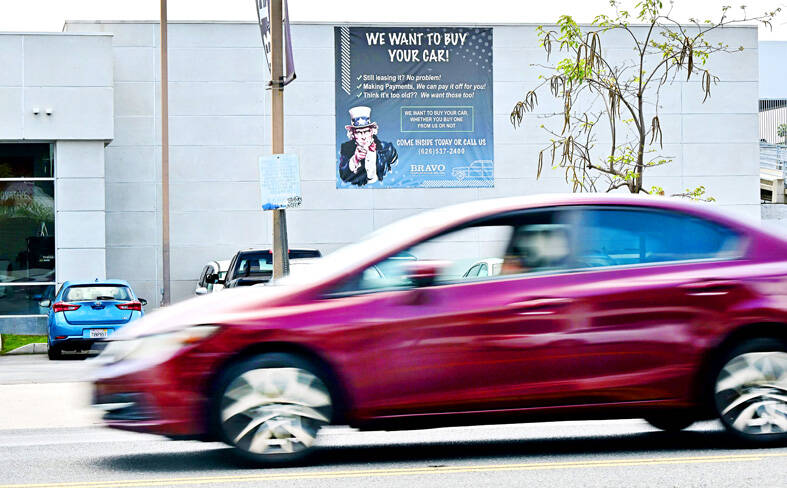US President Donald Trump is on track to ease the impact of his auto tariffs, with changes sought by the industry that would lift some levies on foreign parts for cars and trucks made inside the US.
Imported cars would also be given a reprieve from separate tariffs on aluminum and steel, an effort to prevent multiple levies from stacking on top of each other, a White House official said on Monday.
“This deal is a major victory for the president’s trade policy by rewarding companies who manufacture domestically, while providing runway to manufacturers who have expressed their commitment to invest in America and expand their domestic manufacturing,” US Secretary of Commerce Howard Lutnick said in an e-mailed statement.

Photo: AFP
World stocks and the US dollar edged up yesterday by the auto tariff news, with Taipei, Hong Kong, Seoul, Sydney, Singapore, Mumbai and Manila staying in positive territory.
London was flat, but Paris and Frankfurt edged up in the early session yesterday. Shanghai dipped with Wellington, while Tokyo was closed for a holiday.
The expected shift, reported earlier by the Wall Street Journal, comes as Trump prepares to travel to Michigan, the heart of the US auto industry, to mark the first 100 days of his second term in the White House.
A proclamation setting the changes in motion could be signed as soon as yesterday, the official said, before Trump’s planned speech in Macomb County, a carmaking hub and bastion of blue-collar workers that Trump said his tariff plans are meant to help.
The pivot also would represent the latest evolution in Trump’s ever-changing trade strategy, following his decision earlier this month to pause higher tariffs on dozens of trading partners to allow time for negotiations.
The expected changes come just before the 25 percent tariffs on foreign auto parts are set to take effect on Saturday. Under the planned changes, automakers would be able to secure a partial reimbursement for tariffs on imported auto parts, the official said.
In a separate move, Trump is poised to ensure imported autos are not double-tariffed by also paying other levies on steel and aluminum.
“Ford welcomes and appreciates these decisions by President Trump, which will help mitigate the impact of tariffs on automakers, suppliers and consumers,” Ford Motor Co chief executive officer Jim Farley said in a statement.
General Motors (GM) Co chief executive officer Mary Barra said in a separate statement that “we believe the president’s leadership is helping level the playing field for companies like GM and allowing us to invest even more in the US economy.”
Additional reporting by AFP

The Eurovision Song Contest has seen a surge in punter interest at the bookmakers, becoming a major betting event, experts said ahead of last night’s giant glamfest in Basel. “Eurovision has quietly become one of the biggest betting events of the year,” said Tomi Huttunen, senior manager of the Online Computer Finland (OCS) betting and casino platform. Betting sites have long been used to gauge which way voters might be leaning ahead of the world’s biggest televised live music event. However, bookmakers highlight a huge increase in engagement in recent years — and this year in particular. “We’ve already passed 2023’s total activity and

Nvidia Corp CEO Jensen Huang (黃仁勳) today announced that his company has selected "Beitou Shilin" in Taipei for its new Taiwan office, called Nvidia Constellation, putting an end to months of speculation. Industry sources have said that the tech giant has been eyeing the Beitou Shilin Science Park as the site of its new overseas headquarters, and speculated that the new headquarters would be built on two plots of land designated as "T17" and "T18," which span 3.89 hectares in the park. "I think it's time for us to reveal one of the largest products we've ever built," Huang said near the

BIG BUCKS: Chairman Wei is expected to receive NT$34.12 million on a proposed NT$5 cash dividend plan, while the National Development Fund would get NT$8.27 billion Taiwan Semiconductor Manufacturing Co (TSMC, 台積電), the world’s largest contract chipmaker, yesterday announced that its board of directors approved US$15.25 billion in capital appropriations for long-term expansion to meet growing demand. The funds are to be used for installing advanced technology and packaging capacity, expanding mature and specialty technology, and constructing fabs with facility systems, TSMC said in a statement. The board also approved a proposal to distribute a NT$5 cash dividend per share, based on first-quarter earnings per share of NT$13.94, it said. That surpasses the NT$4.50 dividend for the fourth quarter of last year. TSMC has said that while it is eager

China yesterday announced anti-dumping duties as high as 74.9 percent on imports of polyoxymethylene (POM) copolymers, a type of engineering plastic, from Taiwan, the US, the EU and Japan. The Chinese Ministry of Commerce’s findings conclude a probe launched in May last year, shortly after the US sharply increased tariffs on Chinese electric vehicles, computer chips and other imports. POM copolymers can partially replace metals such as copper and zinc, and have various applications, including in auto parts, electronics and medical equipment, the Chinese ministry has said. In January, it said initial investigations had determined that dumping was taking place, and implemented preliminary